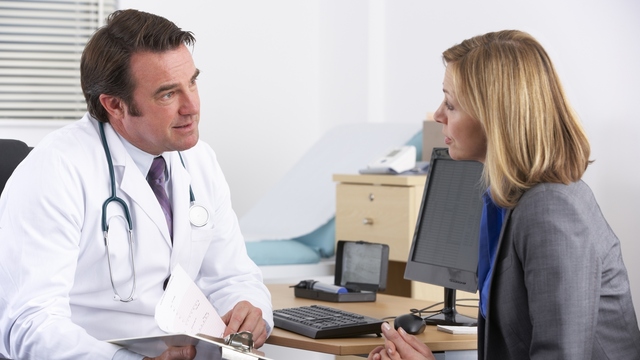 MonkeyBusiness Images/PhotoSpin
MonkeyBusiness Images/PhotoSpin
Don’t you want to be healthy for as long as possible? Staying healthy actually starts while you are still healthy.
Getting your regularly scheduled checkups can help you preserve your health and wellbeing for as long as possible.
If you're already living with some disease it is even more important to make sure you get your checkups. This can help you to manage and possibly reverse your illness and take you back to health.
Basic Blood Work!
There is so much information that we can learn just by getting blood drawn on a regular basis.
Here are tests that should be run on your blood:
• Complete blood count to see the state of our red blood cells and our white blood cells.
• Metabolic panel to look at liver, kidney, spleen function along with basic blood nutrients.
• Blood glucose and HbA1c which looks at your blood glucose over a 3-month period.
• Lipid panel to check total cholesterol as well as your specific good and bad cholesterols. The ratio between your HDL and total cholesterol levels should also be checked.
• HIV test looks at your human immunodeficiency virus viral load if any.
• Thyroid panel including TSH levels, T3 and T4 levels. As women get older their thyroid function can get derailed and cause havoc on the metabolism.
• Estrogen, progesterone, testosterone, FSH and LH are our female hormones and as we move into menopause they can cause a number of symptoms including hot flashes and mood swings.
While you are in the office getting your blood drawn there are a few physical exams you can have done that give information about your health status and risk factors.
Get Your Blood Pressure Checked
Normal blood pressure is around 120/80 mmHg. As the blood pressure increases so does the risk for heart attack and stroke.
Check Your Weight
Body mass index (BMI) tells you if you are overweight based on your height and weight measurements. It is one of the first measurements for obesity. Obesity is a risk factor for chronic diseases like heart disease, stroke, cancer and diabetes.
Colonoscopy
Starting at age 50, it is recommended that women have a colonoscopy. This gives information about polyps or colon cancer. If everything is normal then have the test repeated every 10 years. If there are abnormal findings then women will be treated and rechecked every five years after receiving a clean bill of health.
Mammograms
Not all medical institutions agree on the same guidelines for mammograms. The American Cancer Society recommends women age 40 and over have yearly mammograms. The U.S. Preventive Services Task Force recommends women begin screening at 50 years old and repeat every two years.
Talk with your doctor about the best plan for you.
Have Bones Checked
A dual-energy x-ray absorptiometry (DEXA) scan is the test to determine bone density. Postmenopausal women are at highest risk for osteoporosis because their estrogen, which preserves bone density, is no longer available to them.
So if you are over 50 and you are still menstruating then get a bone density scan when you start perimenopause because your estrogen levels have likely dropped. Once you turn 65 you should get a DEXA scan. If you are at risk for osteoporosis then you should have a scan completed earlier.
Pelvic Exam and Pap Smear
Get a Pap smear every three years to screen for cervical cancer. If you are over the age of 30, you can combine your pelvic exam with a human papillomavirus (HPV) test every five years. If you are over the age of 65, talk to your doctor about frequency of testing.
Keep Your Vision Intact
Have an eye exam every two years if you don’t wear glasses. Make sure to be checked for glaucoma after 45 years of age. If you have high blood sugar this can also impact your eye health.
Depression
Your mental health is as important and arguably more important than your physical health. If you are feeling down, sad, hopeless, or have little pleasure in doing things for two weeks consistently or more, talk to your doctor about having an assessment.
These 15 tests will help you stay healthy!
Live Vibrantly,
Dr. Dae
Naturopathic Physician
Diabetes Ambassador Champion, National Capital Area Region
Dr. Dae's website: www.healthydaes.com
Dr. Dae's book: Daelicious! Recipes for Vibrant Living can be purchased @ www.healthydaes.com
Dr. Dae's Bio:
Dr. Daemon Jones is your diabetes reversal, hormones, metabolism and weight loss expert. Dr. Dae is a naturopathic doctor who treats patients all over the country using Skype and phone visits. Visit her or schedule a free consultation at her website www.HealthyDaes.com
Sources:
American Cancer Society Guidelines for the Early Detection of Cancer. (n.d.). Retrieved December 1, 2014, from
http://www.cancer.org/healthy/findcancerearly/cancerscreeningguidelines/american-cancer-society-guidelines-for-the-early-detection-of-cancer
Healthcare 411. (n.d.). Retrieved December 1, 2014, from
http://www.ahrq.gov/patients-consumers/prevention/lifestyle/women-over-50.html
Important Middle Age Medical Tests - WebMD. (n.d.). Retrieved December 1, 2014, from
http://www.webmd.com/healthy-aging/guide/milestone-medical-tests-50
Health Matters Fact Sheets. Association of Reproductive Health Professionals.
http://www.arhp.org/publications-and-resources/patient-resources/fact-sheets/understanding-pap-test-results
Mammogram. (n.d.). Retrieved December 1, 2014, from
http://www.mayoclinic.org/tests-procedures/mammogram/expert-answers/mammogram-guidelines/faq-20057759.
Gregg EW. Implications of risk stratification for diabetes prevention: the case of hemoglobin A1c. Am J Prev Med. 2013 Apr;44(4 Suppl 4):S375-80. doi: 10.1016/j.amepre.2012.12.012.
http://www.ncbi.nlm.nih.gov/pubmed/23498302
Reviewed December 3, 2014
by Michele Blacksberg RN
Edited by Jody Smith





Add a CommentComments
There are no comments yet. Be the first one and get the conversation started!